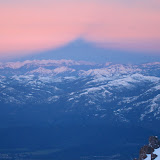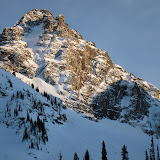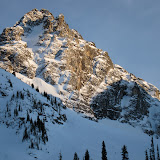 Over the Memorial Day weekend, I joined a guided ASI group trip to ski on Mount Shasta. On Sunday, two separate groups formed with the two ASI guides. Two of us, with the lead guide, had the goal of attempting to summit Shasta and ski down from as high as possible. Because of avalanche danger from the recent snow, we ended up camping at Horse Camp (7800 ft) rather than at Hidden Valley (over 10k). The good news on that is that Horse Camp has composting toilets, so we avoided the indignities of poop bags. The bad news is that the climb from Horse Camp is almost 6400 ft vertical, a tall order on a single push. We left at 1:30am under a beautiful late full moon, no headlamps needed. We skinned all the way past Helen Lake to 11500 ft, where skinning became too inefficient for the steepening slope. We were making very good time. We switched then to boot crampons, following the very well defined bootpack that the many climbers overnighting at Helen Lake on a great holiday weekend had created. The dawning day was glorious: cool, some cloud, great visibility, low to moderate winds. As we climbed towards the Red Banks, I started to feel a bit strange, nothing big or obvious, just different. We kept going still at a reasonable pace, but as we cleared the Red Banks and moved up to Short Hill, I was having a weird feeling around my stomach and chest, although my legs were fine and my breath steady. I managed Short Hill and then Misery Hill, at a somewhat slower pace, still carrying skis. We left the skis at the top of Misery Hill, and after talking with the guide, we agreed that we'd walk the summit plateau to the bottom of the summit cone, and if I wasn't feeling better, I should just rest there in the warm sun while the guide and the other client would to the last 190 ft to the cone summit, as the guide was concerned that I'd lose my remaining strength and then not be able to ski down safely. That's what happened. I sat against a rock, dozing, taking a few pictures, enjoying the warmth, while they got up and down in less than half an hour. It was a bit of a struggle to walk back to the top of Misery Hill and gear up for skiing down, but surprisingly, I felt better as soon as we started skiing and losing elevation. There was wonderful recrystalized winter windpack on the east side of Misery Hill, away from the rocky windblown ridge that everyone walks up. We crossed to the other side at the bottom of Misery Hill, and took another pitch, more variable in snow surface but still good skiing, down to the top of Red Banks. Feeling better again. Dropped through a slot in Red Banks (nothing as fancy as the Trinity Chutes, which appeared to be rime-encrusted) through variable, crusty snow, but then opened up into exceptional spring snow, sun-softened new snow on top of a firm base, especially on the very long pitch below the Trinity Chutes. We skied high speed turns until our legs screamed, and then we skied high speed turns again. And again. All the way back to camp, with softer and softer conditions, but never mashed potatoes. Back to camp in less then 11 hours and over 6000 ft of amazing skiing for May 30th. And I was feeling perfect, not really tired, as if more normal oxygen had totally rebooted my body. We hung out around camp until an early dinner, and I slept beautifully from 8pm to 6am.
Over the Memorial Day weekend, I joined a guided ASI group trip to ski on Mount Shasta. On Sunday, two separate groups formed with the two ASI guides. Two of us, with the lead guide, had the goal of attempting to summit Shasta and ski down from as high as possible. Because of avalanche danger from the recent snow, we ended up camping at Horse Camp (7800 ft) rather than at Hidden Valley (over 10k). The good news on that is that Horse Camp has composting toilets, so we avoided the indignities of poop bags. The bad news is that the climb from Horse Camp is almost 6400 ft vertical, a tall order on a single push. We left at 1:30am under a beautiful late full moon, no headlamps needed. We skinned all the way past Helen Lake to 11500 ft, where skinning became too inefficient for the steepening slope. We were making very good time. We switched then to boot crampons, following the very well defined bootpack that the many climbers overnighting at Helen Lake on a great holiday weekend had created. The dawning day was glorious: cool, some cloud, great visibility, low to moderate winds. As we climbed towards the Red Banks, I started to feel a bit strange, nothing big or obvious, just different. We kept going still at a reasonable pace, but as we cleared the Red Banks and moved up to Short Hill, I was having a weird feeling around my stomach and chest, although my legs were fine and my breath steady. I managed Short Hill and then Misery Hill, at a somewhat slower pace, still carrying skis. We left the skis at the top of Misery Hill, and after talking with the guide, we agreed that we'd walk the summit plateau to the bottom of the summit cone, and if I wasn't feeling better, I should just rest there in the warm sun while the guide and the other client would to the last 190 ft to the cone summit, as the guide was concerned that I'd lose my remaining strength and then not be able to ski down safely. That's what happened. I sat against a rock, dozing, taking a few pictures, enjoying the warmth, while they got up and down in less than half an hour. It was a bit of a struggle to walk back to the top of Misery Hill and gear up for skiing down, but surprisingly, I felt better as soon as we started skiing and losing elevation. There was wonderful recrystalized winter windpack on the east side of Misery Hill, away from the rocky windblown ridge that everyone walks up. We crossed to the other side at the bottom of Misery Hill, and took another pitch, more variable in snow surface but still good skiing, down to the top of Red Banks. Feeling better again. Dropped through a slot in Red Banks (nothing as fancy as the Trinity Chutes, which appeared to be rime-encrusted) through variable, crusty snow, but then opened up into exceptional spring snow, sun-softened new snow on top of a firm base, especially on the very long pitch below the Trinity Chutes. We skied high speed turns until our legs screamed, and then we skied high speed turns again. And again. All the way back to camp, with softer and softer conditions, but never mashed potatoes. Back to camp in less then 11 hours and over 6000 ft of amazing skiing for May 30th. And I was feeling perfect, not really tired, as if more normal oxygen had totally rebooted my body. We hung out around camp until an early dinner, and I slept beautifully from 8pm to 6am.
It was totally worth it. Both the guide and the other client on the climb did exactly what was needed at every point. A bit of a bummer that I passed summit bragging rights, but it was way better to rest and ski down well, than any of the scary alternatives. Later, my companions told me about some weird things I said on the summit plateau that I totally did not remember. I didn't have the classic altitude sickness symptoms (headaches, shallow breath), but apparently I complained of blurred vision -- which I don't remember -- and they said my speech was a bit messed up. I guess I learned something about my body's response to being above 13k. Whether this is a constant of my constitution or was the result of a relatively fast ascent from sea level to high elevation, I won't know until the next time.






